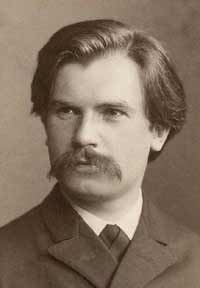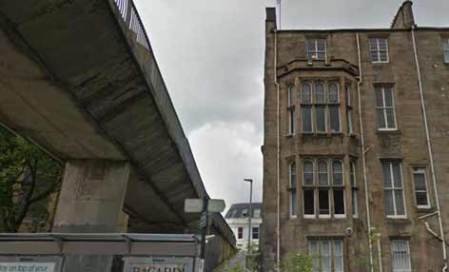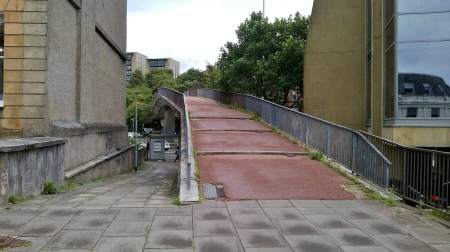
Eugen d’Albert was born in 4 Crescent Place, Charing Cross, Glasgow on 10 April 1864.
There seems to be a bit of confusion regarding his exact place of birth in Glasgow; some sources stating 9 Newton Place in Charing Cross, and others showing Crescent Grove in Knightswood. Hence this page resolves the issue.
Wikipedia is correct in stating that d’Albert’s birth certificate states 4 Crescent Place; also confirmed by census. His birth certificate states that 4 Crescent Place is in the Anderston district, but today that area is probably best described as in Charing Cross.

The above 1857 map shows the Charing Cross and Woodside area of Glasgow. At the bottom of the map is Crescent Place.
A closer look…

It shows that Crescent Place ran between (on left) Woodside Crescent and (on right) St. Georges Road. This stretch of St. Georges Rd is now known as North St.

Crescent Place is unfortunately no longer in existence. It has been replaced by a pedestrian overpass which runs from Woodside Crescent to Renfrew Street. Perhaps a campaign should be started to name this overpass in honour of Eugen d’Albert!

The view north and west from Crescent Place today…

D’Albert had an English mother, Annie Rowell, and a German-born father of French and Italian descent, Charles Louis Napoléon d’Albert (1809–1886), whose ancestors included the composers Giuseppe Matteo Alberti and Domenico Alberti. D’Albert’s father was a dancer, pianist and music arranger who had been ballet-master at the King’s Theatre and at Covent Garden. He was 55 years old on Eugen’s birth and was to be his first music teacher.
At the age of 10, Eugen entered the National Training School (now the Royal College of Music) in London, where he studied piano with Ernst Pauer and theory with Sir John Stainer, Ebenezer Prout, and Arthur Sullivan (of Gilbert and Sullivan); and achieved early success in England as a bravura pianist.
In 1881 d’Albert won the Mendelssohn Scholarship, enabling him to study in Vienna, where he met Johannes Brahms and Franz Liszt. From Austria he emigrated to Germany, becoming a pupil of the elderly Liszt and beginning a career as a concert pianist.
At the same time d’Albert focused increasingly on composing, producing 21 operas and a considerable output of piano, vocal, chamber and orchestral works.
His most successful opera was Tiefland, which premièred in Prague in 1903. His successful orchestral works included his cello concerto (1899), a symphony, two string quartets and two piano concertos.
D’Albert toured extensively, including in the United States from 1904 to 1905. In 1907, d’Albert became the director of the Hochschule für Musik in Berlin, where he exerted a wide influence on musical education in Germany. He also held the post of Kapellmeister to the Court of Weimar.
In the wake of his success, he adopted German citizenship, and made repeated statements derogatory to English culture and his former English music teachers. He further changed his first name from Eugene to its German form, Eugen.
D’Albert was married six times: to Louise Salingré; to the pianist, singer and composer Teresa Carreño; to mezzo-soprano Hermine Finck; actress Ida Fulda; Friederike Jauner; and Hilde Fels. He had eight children.
In 1914, d’Albert moved to Zurich and became a Swiss citizen. During World War I, he was vocal in his enmity toward England, which led in turn to an understandable repugnance among English musicians to accept his music.
In John Purser’s biography of Erik Chisholm ‘Chasing a Restless Muse’, he noted d’Albert’s frequent visits back to Scotland in the following anecdote when Chisholm was registering his daughter’s birth and got into conversation with the Glasgow registrar:
“Weel” said the clerk, “Ye’re nothing like so particular as a wee red-heeded fella who kept coming back here; he had a kinda queer name – whit was it noo? Albert something? Dalbert. That’s it. Dalbert. You-gene Dalbert. He was a pee-anist, too, and every time he was playing in Glesca he came up here to see if we would change his birth certificate. He didna’ want his fether’s profession to be jest ‘Dancin’ but ‘Maitre de Ballet'”.
D’Albert died on the 3rd March 1932 at the age of 67 in Riga, Latvia, where he had travelled for a divorce from his sixth wife. In the weeks preceding his death, d’Albert was the subject of attacks by the press in Riga concerning his personal life. His last companion was a mistress, Virginia Zanetti. D’Albert’s final opera, Mister Wu, was left unfinished at his death and was completed by conductor Leo Blech. D’Albert was buried in the cemetery overlooking Lake Lugano in Morcote, Switzerland.
Selected Works:
Symphonic Prologue to the Opera Tiefland : ![]()

